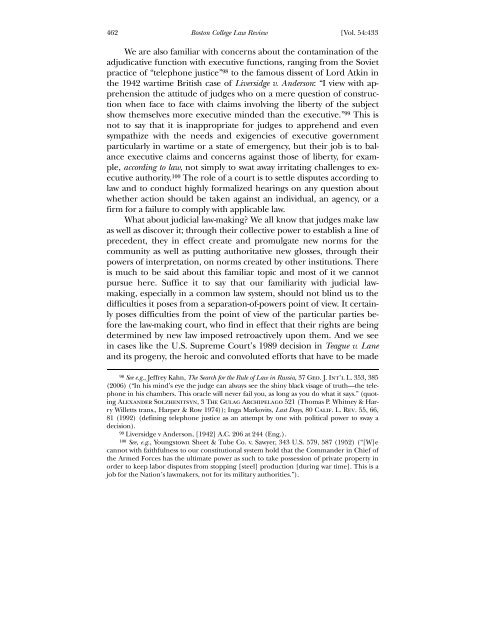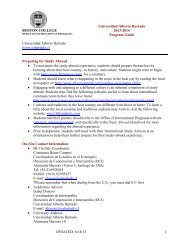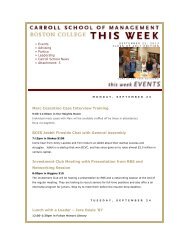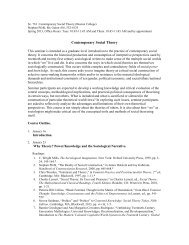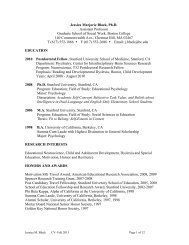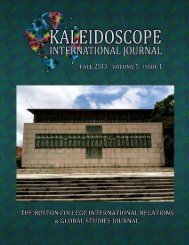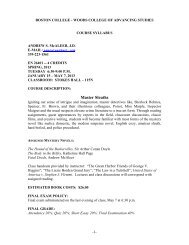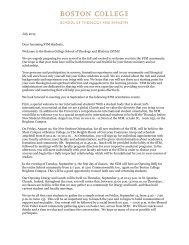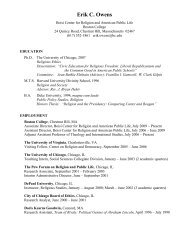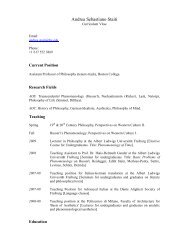separation of powers in thought and practice? - Boston College
separation of powers in thought and practice? - Boston College
separation of powers in thought and practice? - Boston College
Create successful ePaper yourself
Turn your PDF publications into a flip-book with our unique Google optimized e-Paper software.
462 <strong>Boston</strong> <strong>College</strong> Law Review [Vol. 54:433<br />
We are also familiar with concerns about the contam<strong>in</strong>ation <strong>of</strong> the<br />
adjudicative function with executive functions, rang<strong>in</strong>g from the Soviet<br />
<strong>practice</strong> <strong>of</strong> “telephone justice”98 to the famous dissent <strong>of</strong> Lord Atk<strong>in</strong> <strong>in</strong><br />
the 1942 wartime British case <strong>of</strong> Liversidge v. Anderson: “I view with apprehension<br />
the attitude <strong>of</strong> judges who on a mere question <strong>of</strong> construction<br />
when face to face with claims <strong>in</strong>volv<strong>in</strong>g the liberty <strong>of</strong> the subject<br />
show themselves more executive m<strong>in</strong>ded than the executive.”99 This is<br />
not to say that it is <strong>in</strong>appropriate for judges to apprehend <strong>and</strong> even<br />
sympathize with the needs <strong>and</strong> exigencies <strong>of</strong> executive government<br />
particularly <strong>in</strong> wartime or a state <strong>of</strong> emergency, but their job is to balance<br />
executive claims <strong>and</strong> concerns aga<strong>in</strong>st those <strong>of</strong> liberty, for example,<br />
accord<strong>in</strong>g to law, not simply to swat away irritat<strong>in</strong>g challenges to executive<br />
authority.100 The role <strong>of</strong> a court is to settle disputes accord<strong>in</strong>g to<br />
law <strong>and</strong> to conduct highly formalized hear<strong>in</strong>gs on any question about<br />
whether action should be taken aga<strong>in</strong>st an <strong>in</strong>dividual, an agency, or a<br />
firm for a failure to comply with applicable law.<br />
What about judicial law-mak<strong>in</strong>g? We all know that judges make law<br />
as well as discover it; through their collective power to establish a l<strong>in</strong>e <strong>of</strong><br />
precedent, they <strong>in</strong> effect create <strong>and</strong> promulgate new norms for the<br />
community as well as putt<strong>in</strong>g authoritative new glosses, through their<br />
<strong>powers</strong> <strong>of</strong> <strong>in</strong>terpretation, on norms created by other <strong>in</strong>stitutions. There<br />
is much to be said about this familiar topic <strong>and</strong> most <strong>of</strong> it we cannot<br />
pursue here. Suffice it to say that our familiarity with judicial lawmak<strong>in</strong>g,<br />
especially <strong>in</strong> a common law system, should not bl<strong>in</strong>d us to the<br />
difficulties it poses from a <strong>separation</strong>-<strong>of</strong>-<strong>powers</strong> po<strong>in</strong>t <strong>of</strong> view. It certa<strong>in</strong>ly<br />
poses difficulties from the po<strong>in</strong>t <strong>of</strong> view <strong>of</strong> the particular parties before<br />
the law-mak<strong>in</strong>g court, who f<strong>in</strong>d <strong>in</strong> effect that their rights are be<strong>in</strong>g<br />
determ<strong>in</strong>ed by new law imposed retroactively upon them. And we see<br />
<strong>in</strong> cases like the U.S. Supreme Court’s 1989 decision <strong>in</strong> Teague v. Lane<br />
<strong>and</strong> its progeny, the heroic <strong>and</strong> convoluted efforts that have to be made<br />
98 See e.g., Jeffrey Kahn, The Search for the Rule <strong>of</strong> Law <strong>in</strong> Russia, 37 Geo. J. Int’l L. 353, 385<br />
(2006) (“In his m<strong>in</strong>d’s eye the judge can always see the sh<strong>in</strong>y black visage <strong>of</strong> truth—the telephone<br />
<strong>in</strong> his chambers. This oracle will never fail you, as long as you do what it says.” (quot<strong>in</strong>g<br />
Alex<strong>and</strong>er Solzhenitsyn, 3 The Gulag Archipelago 521 (Thomas P. Whitney & Harry<br />
Willetts trans., Harper & Row 1974)); Inga Markovits, Last Days, 80 Calif. L. Rev. 55, 66,<br />
81 (1992) (def<strong>in</strong><strong>in</strong>g telephone justice as an attempt by one with political power to sway a<br />
decision).<br />
99 Liversidge v Anderson, [1942] A.C. 206 at 244 (Eng.).<br />
100 See, e.g., Youngstown Sheet & Tube Co. v. Sawyer, 343 U.S. 579, 587 (1952) (“[W]e<br />
cannot with faithfulness to our constitutional system hold that the Comm<strong>and</strong>er <strong>in</strong> Chief <strong>of</strong><br />
the Armed Forces has the ultimate power as such to take possession <strong>of</strong> private property <strong>in</strong><br />
order to keep labor disputes from stopp<strong>in</strong>g [steel] production [dur<strong>in</strong>g war time]. This is a<br />
job for the Nation’s lawmakers, not for its military authorities.”).


